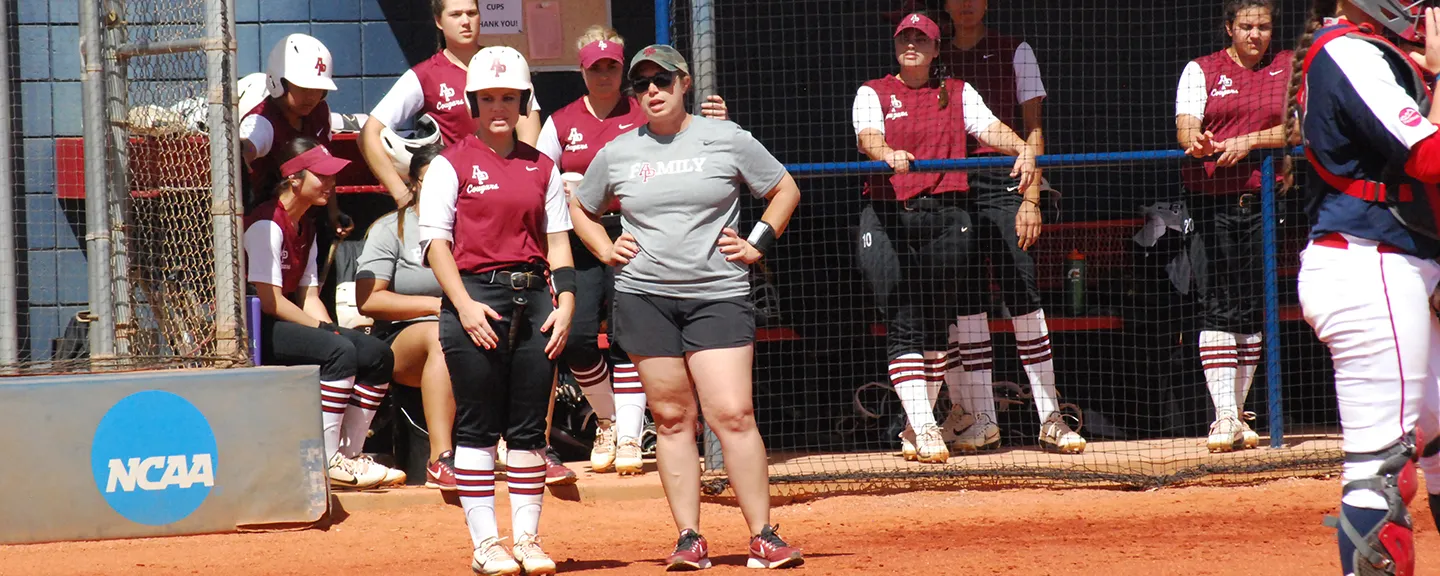- Home
- >
- APU Articles
- >
- News Article
Succeeding as a College Athlete: The Importance of Finding a Coach-Mentor
June 12, 2018 | Written By Ana Felce

Student-athletes face long days and busy schedules, making their college experience very different from the majority of their peers. In order to prove themselves on the field and in the classroom (and thrive in their academic and athletic roles), college athletes need a solid support system.
Azusa Pacific University sophomore Emily Moran plays on the university’s softball team and recognizes that it can sometimes be difficult to balance her time and attention between her studies and sport. However, like any responsible student, she knows that her studies are ultimately her main priority. Having the support of a coach who also understands that fact has helped her find the right balance.
Keeping Eyes on the Prize
For student-athletes, competing as a representative of the university is incredibly important. But, as Moran points out, academics are just as important—if not slightly more so. She recounts a senior teammate commenting after her final game that she felt like she no longer had a talent. To avoid feeling this sense of loss, Moran notes that, “It is important to be in a major that you’re passionate about, and it’s as equally important to work hard and thrive in the classroom as it is on the field.”
In her opinion, athletes receiving a scholarship should give 100 percent during practice and games, treating the commitment like a job. However, college is meant to prepare young adults for their lives and careers following graduation, and therefore, it’s just as important to focus on academics.
Only around 2 percent of college athletes are able to play professionally after college, according to the NCAA. This means—as Moran points out on her blog—the other 98 percent have to learn how to be a part of the “real world.”
“Athletes spend their whole lives training for their sport, how are they supposed to just be thrown into the ‘real world?’” Moran writes. For this reason, it’s important that students don’t lose sight of their academic goals.
Striking a Balance
So, how does a college athlete strike a balance between studying and making it to practice? They have to be passionate about the work they’re doing, and want to do it, explains Moran. It’s no secret that schedules can get hectic. When workloads seem high, students have to take responsibility, work hard, and focus on their goals.
While Moran admits it can sometimes be a challenge to make time to study, stay game-ready, and find time for herself, she believes it’s all worth it. Student-athletes don’t have a lot of free time, but at APU, Sundays are free from competition and players have some time to themselves, which is something Moran is very grateful for.
But it’s not just her personal drive that gets her through those busy days. Her softball coach, Carrie Webber, has also played an integral role (both on and off the field) as a mentor.
Finding Support in a Mentor
Webber is very supportive of students’ academic pursuits, serving as a mentor to the entire team. “I have been lucky to have a coach that opens her house to us as a place to study, eat, worship, or just hang out,” Moran says.
When student-athletes find a coach who is willing to listen and help you succeed academically, it makes it much easier to deal with the unique challenges athletes face. A coach’s support for his or her players can be the most important thing for those athletes, encouraging them to not give up, even during stressful times.
While it’s not always easy being both a student and an athlete, Moran says Coach Webber’s concern for her individual players has played a large role in her success as a college athlete—and that has made all the difference.
Recommended for You
How to Balance Sports and Studies as a Student-Athlete
6 Crucial Study Habits for College Students